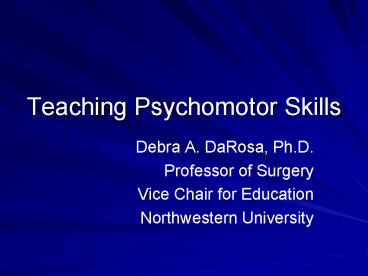Teaching Psychomotor Skills PowerPoint PPT Presentation
Title: Teaching Psychomotor Skills
1
Teaching Psychomotor Skills
- Debra A. DaRosa, Ph.D.
- Professor of Surgery
- Vice Chair for Education
- Northwestern University
2
What gets in the way of learning?
What enhances the learning of skills?
3
Problems in Learning Skills
- Cognitive
- Perceptual
- Coordination
- Chain of motor responses
- Organization of response chains
- Eye hand coordination
- Tension - Relaxation
- Forgotten
- Emotion
4
How do we acquire skills?
- A Skill Acquisition Model
- Cognitive
- Associative
- Automatic
- Fitts AM, Posner. Human Performance. Belmont CA
Brooks-Cole 1967.
5
Cognitive Stage
- Rationale, indications, contraindications and
potential complications for the procedure - Explain/demonstrate sequential steps
- Ensure learners can articulate sequential steps
6
Cognitive Task Analysis
- Arises from Human Factors
- Group of analytical techniques designed to
capture expert thinking - Specifies the judgment and technical steps of a
procedure
7
CTA Example
- During the course of a laparoscopic
cholecystectomy, the surgery resident variously
strays into the lumen of the gallbladder and the
parenchyma of the liver.
8
Associative Phase
- Active 0bservation
- Diagnose any problems/strengths
- Prescribe (and demonstrate) a plan for
improvement (feedback) - Allow practice
- Repeat
9
Feedback
- Inherent feedback
- Augmented feedback
- Knowledge of Results (KR)
- Knowledge of Performance (KP)
- FREQUENCY TIMING!!
10
Empirical Findings Feedback
- Too much feedback is used as crutch
- KR feedback is better
- Learners learn more when expected to explore and
evaluate their own errors - Feedback given too quickly or frequently can
short-change the learning process.
11
Autonomous Stage
- Less intense attention
- Memorized motor movement/instincts
- Influenced less- external cues
- Unconsciously competent
12
The Coach Model
- C Clear Performance Model
- O Openness to Learning
- A Assess Performance
- C Communication
- H Help and Follow-up
PowerShow.com is a leading presentation sharing website. It has millions of presentations already uploaded and available with 1,000s more being uploaded by its users every day. Whatever your area of interest, here you’ll be able to find and view presentations you’ll love and possibly download. And, best of all, it is completely free and easy to use.
You might even have a presentation you’d like to share with others. If so, just upload it to PowerShow.com. We’ll convert it to an HTML5 slideshow that includes all the media types you’ve already added: audio, video, music, pictures, animations and transition effects. Then you can share it with your target audience as well as PowerShow.com’s millions of monthly visitors. And, again, it’s all free.
About the Developers
PowerShow.com is brought to you by CrystalGraphics, the award-winning developer and market-leading publisher of rich-media enhancement products for presentations. Our product offerings include millions of PowerPoint templates, diagrams, animated 3D characters and more.

